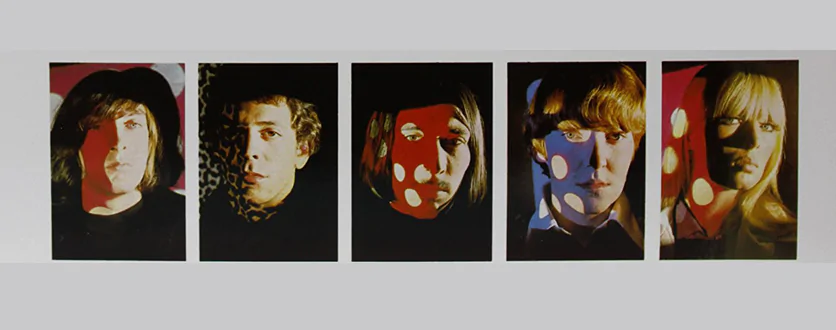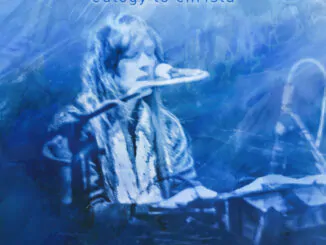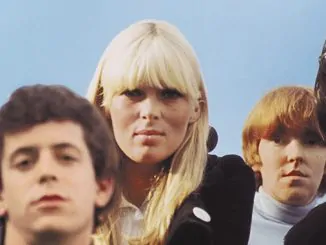
It’s been 50 years since the ground-breaking album The Velvet Underground & Nico was created from the heart of the New York music scene. It charted unfamiliar territory with its avant-garde, experimental sounds. Comprising of Lou Reed, (from New York) and John Cale (a Welshman), Sterling Morrison and Maureen “Moe” Tucker they met during the years 1964-66 and produced said album with the now famous peeling banana cover, (created by Andy Warhol, originator of Pop Art) being released in March 1967.
It failed to gain commercial success at the time but later became widely recognised, as the band did, as pioneers of their time with their droning sound and dark, mesmerizing lyrics. It went on to become one of the most influential and critically acclaimed rock albums in history, appearing at number thirteen on Rolling Stone magazine’s list of the 500 Greatest Albums of All Time.. When Nico, the German born sultry blonde singer was introduced to the band by their then manager, legendary Warhol, a record deal was sealed and their place in rock n roll history was born.
Whilst Warhol was credited as the producer for said record he actually had little authority beyond financial input for the band’s recording sessions. Whilst John Cale has been cited as the album’s creative producer he later stated that it was Tom Wilson. Lou Reed, in a later interview elaborated his view. On Warhol he stated: “He just made it possible for us to be ourselves and go right ahead with it because he was Andy Warhol.”
The first song Sunday Morning is a personal favourite of mine. It’s like a nursery rhyme with its xylophone sound (apparently from a celesta). Lou Reed’s lyrics are almost pretty, making it sound innocent but it feels like there’s a dark undercurrent to it. I’ve always loved songs that conflict like that. I love the line “Watch out the world’s behind you, there’s always someone around you who will call”: a classic. Nico was meant to sing this song but instead Reed decided to sing it himself.
I’m Waiting for the Man contrasts starkly as the protagonist waits for his heroin drug dealer. The content is bleak but it has a catchy, if droning refrain. “I’m waiting for my man, twenty-six dollars in my hand, up to Lexicon, 125, feel sick and dirty, more dead than alive, I’m Waiting for My Man.”. The piano and guitar sound is hypnotic.
Track three is my all-time favourite by VE and Nico: Femme Fatale which I first heard age 16. It’s gentle introduction has a similar feel to the beginning of Sunday Morning but then Nico’s breathy vocals intersperse with beautiful chords to sing about the protagonist: “You’re written in her book, you’re number thirty seven, have a look, she’s going to smile to make you frown, what a clown” are beguiling. I didn’t realise until years later that it was written, at Warhol’s request about the extremely iconic Edie Sedgwick, a particularly troubled actress and model who became one of Warhol’s Superstars in Factory, the studio warehouse where exhibitionism and experimentation of actors and models was encouraged in any shape or form.
Venus in Furs displays more dronelike but at the same time hypnotic and compelling sounds. John Cale’s viola is mesmerizing as is Reed’s guitar. The lyrics sing darkly of sado-masochism and the like and is interpreted from the 19th century novel “Venus in Furs”. Run Run Run sings further of several characters trying to get their fix of heroin and has a great guitar solo from Reed.
All Tomorrow’s Parties is the second of the trilogy of songs sung by Nico with that trademark guitar. It was written by Reed and inspired by what was described as Reed’s reflections of the Factory circle, the characters that resided there. It feels sad and sombre. “What costume shall the poor girl wear to all tomorrow’s parties, a hand-me-down dress from who knows where to all tomorrow’s parties.”
Heroin starts gently with guitar and Tucker’s percussion which builds the tension adding viola and then Reed’s sultry vocal. “I don’t know just where I’m going, but I’m going to try for the kingdom if I can” then it grows frenetic and the song tells of a user’s drug rush. Much of the controversial lyrics of the album meant that on release many record stores banned the album and mainstream radio refused to play it. Reed cited he never intended to shock people, he was just a fan of poets such as Ginsberg and Burroughs and thought the topics would translate well to music.
There She Goes Again is another favourite of mine on here. The lyrics are dark (being about prostitution) but the song works well with the guitar and constant refrain of “There she goes”. I’ll Be Your Mirror is the last of the three Nico songs and again contrasts Reed’s vocals. Her voice is both husky and haunting. She could turn a nursery rhyme into something more. It’s a simple song with a refrain “I’ll be your mirror/inflict what you are” and a constant tambourine beat. Apparently (according to interviews with Sterling Morrison Nico sung this song quite aggressively initially which frustrated the band as they wanted a subtle vocal. They did take after take until she finally broke down in tears. After that she did it one more time and that made the final cut.)
The Black Angel’s Death Song is a monosyllabic drone of Cale’s viola and Reed’s vocal which sounds richer on this. The song seems to be about someone or something representing death and their beliefs on life and death. Written by both Reed and Cale it was a favourite of the band that attracted Warhol’s attention. On hearing them play it in November 1965 he was producing the debut by April of 1966.
The final song European Son was dedicated to a man who had taught Reed literature at University: Delmore Schwartz who apparently spoke of detesting lyrics in songs, hence there are only vocals in the first minute of this seven or more minute punkish freefall of sound that was said to take a nod towards their follow-up album White Light/White Heat. Schwartz died alone three months later in Manhattan.
In essence Velvet Underground and Nico album broke the mould and paved the way for future generations. It was an era-defining album, that wasn’t fully appreciated until later years. Indeed if they hadn’t existed there would probably be no Joy Division, Sonic Youth and even the Feelies. David Bowie openly admitted to being a fan writing Queen Bitch as a tribute to Lou Reed and going on to produce Reed’s 1972 album Transformer: indeed a testimony of his admiration for the band and an accolade. John Cale (and guests) will be performing the album next year in Liverpool thus proving the album’s endurance and popularity.





Be the first to comment